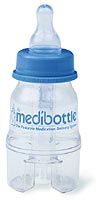 medibottle Clinical Study & Trial Overview
medibottle Clinical Study & Trial Overview
- Study shows medibottle 93% Effective, accepted three times more readily
- Hospital test showed infants take bitter-tasting medicine willingly with medibottle
- Three part, open-label, randomized, cross-over study comparing Effectiveness and Infant Acceptance of the medibottle vs. Oral Syringe (dispenser) in delivering acetaminophen at The University of Illinois at Chicago. The medibottle measured 93% Effective vs. oral syringe at 57%. Ideal Infant Acceptance measured 329% more (over 3 times greater) than the Oral Syringe.
- Children's Memorial Hospital in Chicago enrolled 10 infant patients under the age of 18 months that required chloral hydrate for sedation in their clinic. The RN who administered the drug with 15-30cc's of a clear liquid to the infants wrote, "… because of the bitter taste, I frequently have to restrain the children in order to give the full amount of medication. All ten of the children took the full dose of medication using the medibottle as instructed in the medibottle brochure (with "little squirts"). They not only took the full dose of medication but they took it willingly. If you have ever given chloral hydrate you know this is quite a feat!
Outcomes Measure: Effectiveness equals Percent of infants receiving 100% of intended dose. Ideal infant acceptance equals MAS score of 9 or greater (McNemar test). Conclusion: "medibottle was significantly more effective and had a significantly higher level of infant acceptance compared to the oral medication syringe."
Part III was published in The Journal of Pediatric Pharmacy Practice (PPAG) and the Report, "Infant acceptance and effectiveness of a new oral liquid medication delivery system" was published in American Society of Health-System Pharmacists in June of 1999. *Please see footnotes
It should be noted that five of the ten children had received chloral hydrate in the past and previously required a restraining technique. The parents of these five children, in particular, were very impressed with the medibottle. They were able to see the difference in the child's response to receiving medication."
In summary the RN stated, "…the medibottle is a highly effective way to administer medication to infants who will drink from a bottle. The restraining technique that was used on the infants previously did not have to be utilized when the infants received the chloral hydrate via the medibottle. The medication had been delivered with ease and accuracy therefore allowing that child to complete remainder of the tests."
The abstract for this trial was presented at the Pediatric Pharmacy Advocacy Group (PPAG) Conference October 9, 1998 and published in the Journal of Pediatric Pharmacy Practice. Several medical professionals unrelated to this study are using the device and report that medibottle is delivering an accurate dose of medication to babies who have been exposed to the HIV virus.






